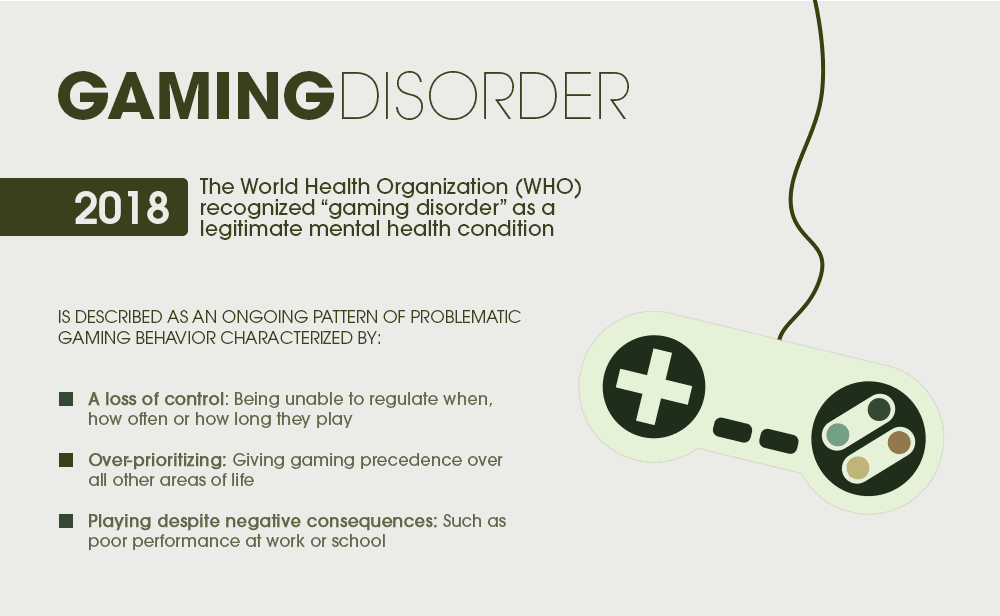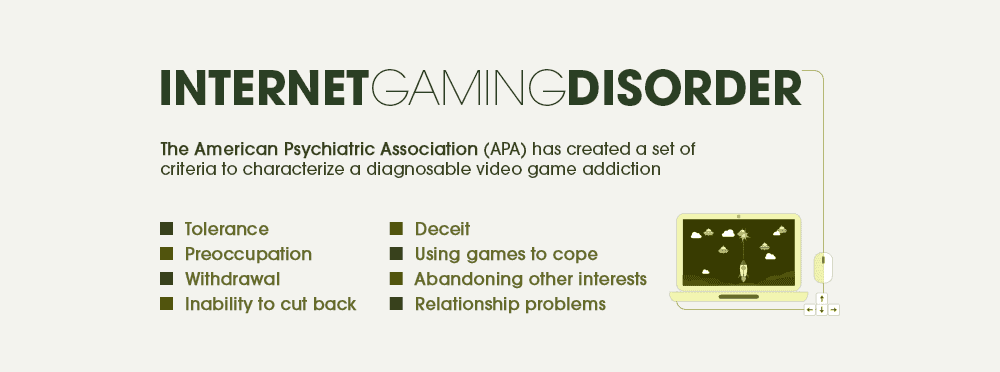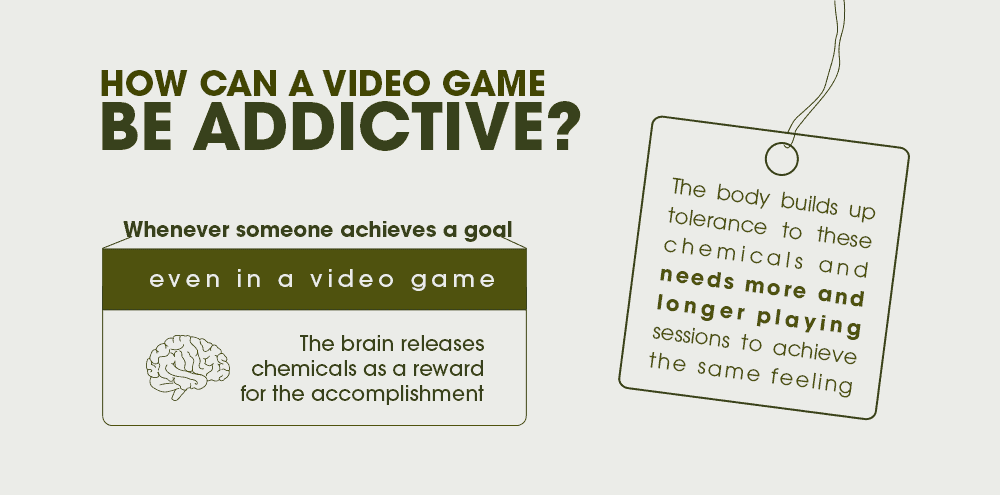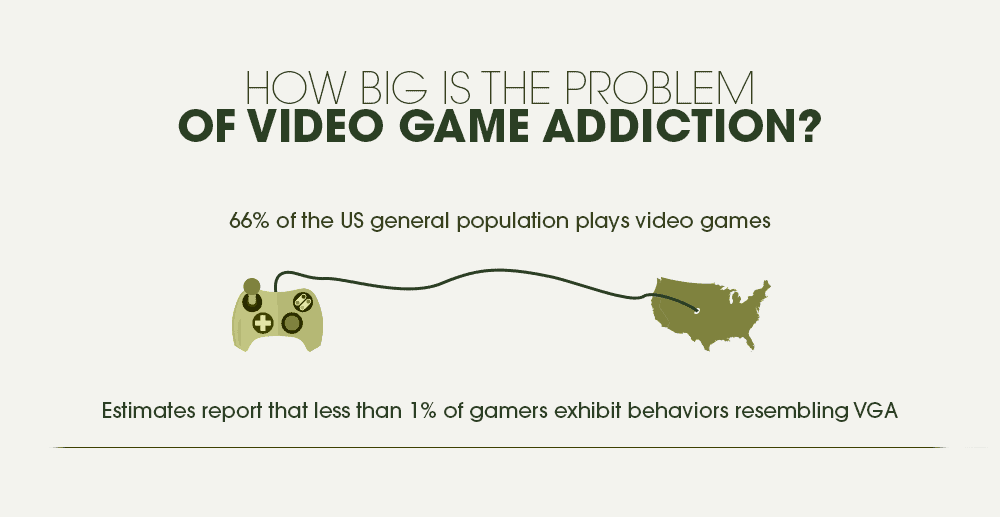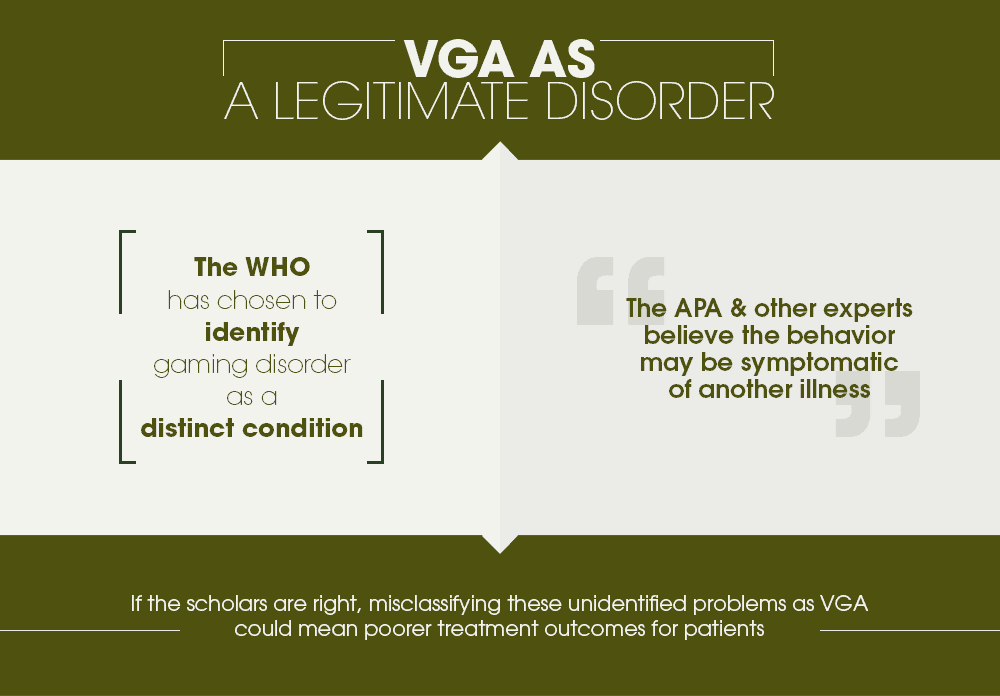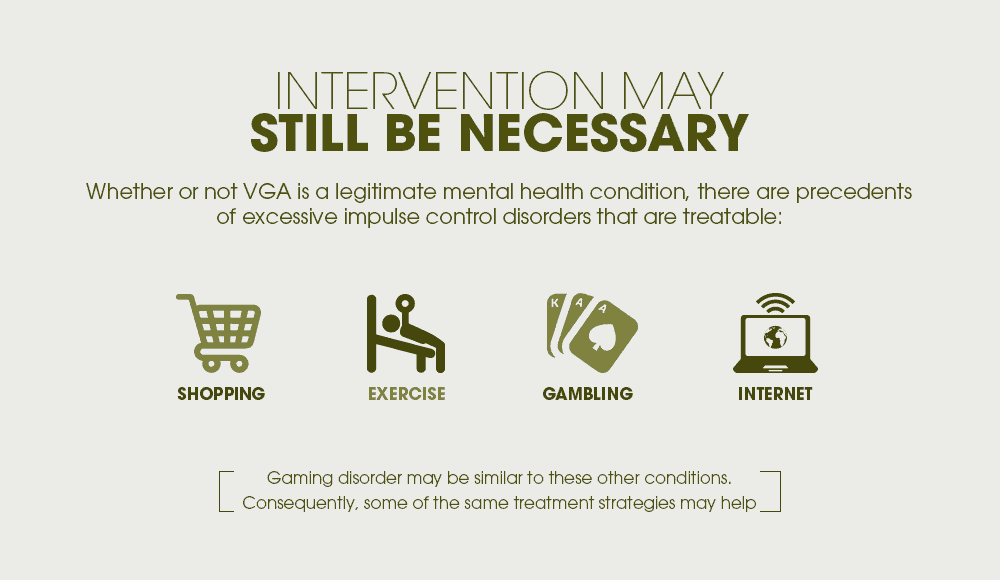In the newest edition of its International Classification of Diseases, just released in June 2018, the World Health Organization has for the first time recognized “gaming disorder” as a legitimate mental health condition. The WHO is the first governing body to officially classify the behavior as a diagnosable illness.
“Get your loved one the help they need. Our substance use disorder program accepts many health insurance plans, this is our residential program.”
First Things First – What Is Gaming Disorder?
The WHO describes the condition as an ongoing pattern of problematic gaming behavior characterized by:
- A loss of control – The person is unable to regulate when, how often, how long, or in what context they play. During play, the gamer may become overinvolved emotionally with the gameplay or results. Additionally, they may become anxious or upset when the game is turned off.
- Over-prioritizing – Giving gaming precedence over all other areas of life – eating, bathing, social interaction, hobbies, outside activities, and other responsibilities.
- Continued gaming despite negative consequences – Even when obsessive gaming is causing problems in other areas of life – poor performance at work or school, absenteeism, relationship issues, money problems, etc. – a person with this disorder will continue or may even escalate gaming.
The biggest characteristic of gaming disorder will be an impairment of the person’s ability to function socially, within the family, educationally, and/or occupationally. Of special relevance, gaming disorder can be a continuous pattern of behavior, or it may be episodic. If the behavior is continuous, it must be evident over a period of at least one year to meet the criteria for an official diagnosis. On the other hand, diagnosis may be appropriate after a shorter interval if the presenting symptoms are severe.
Internet Gaming Disorder According to the American Psychiatric Association
Interestingly, the APA does NOT currently recognize video game addiction as an official game disorder. Although VGA does not appear as a listed condition in the 5th edition of the Diagnostic and Statistical Manual of Mental Disorders, it was included among the “Conditions for Further Study”. Similar to that of other addictive disorders, APA has created a set of criteria that can be used to characterize a diagnosable VGA.
- Preoccupation – Does the person spend an inordinate amount of time thinking about gaming, even when they are not playing? Do they obsess about when they can play next?
- Withdrawal – Does the person suffer emotionally when they are unable to play?
- Anxiety
- Irritability
- Moodiness
- Anger
- Sadness
- Depression
- Tolerance – Does the person need MORE to feel the same excitement and enjoyment?
- Longer gaming time
- More intense games
- Upgraded equipment
- Inability to cut back or stop – Does the person feel (or have they been told) that they need to play less, but are unable to stop?
- Abandonment of other interests – Has the person lost interest in or stopped participating in other recreational activities, especially those that they once enjoyed?
- Deceit – Has the person tried to cover up or lie about how long or how often they game? Do they hide their gaming from friends or family?
- Coping with games – Does the person constantly use video games as a way to escape from uncomfortable feelings, trauma, or other painful emotions?
- Relationship problems – Has the person lost significant real-life relationships because of gaming – jobs, career or educational opportunities, romantic attachments, etc.?
- Continued gaming – Even when gaming is causing problems – poor grades, spending too much money, not getting enough sleep, arguments, etc. – does the person continue to obsess over gaming?
“We treat both addiction and co-occurring disorders and accept many health insurance plans. Take a look at our inpatient program.”
How Can a Video Game Be Addictive?
“Addiction is a primary, chronic disease of brain reward, motivation, memory, and related circuitry.” ~The American Society of Addiction Medicine When most people think of “addiction”, they do so as it relates to substance abuse – alcoholism, illicit drug use, or the misuse of prescription medications. But in recent years, the mental health field has begun moving away from the concept of addiction as purely substance-driven. Instead, addiction is more about impaired reward pathways in the brain that incentivize problematic behaviors. For example, someone addicted to the Internet exhibits the same brain changes as people addicted to drugs. How is this possible? Whenever someone achieves a goal – even in a video game – the brain releases “feel-good” chemicals as a reward for the accomplishment. This is an evolved trait that allows humans to accomplish goals and motivates us to repeatedly perform those actions necessary for survival. But the brain cannot tell the difference between a “natural” positive action such as eating or sex and an artificial action such as being a video game or gambling, because each can trigger a pleasurable reward. In most people, there are feedback mechanisms in place that allow us to be sated – we are able to say “enough”. This is why some people can stop after a couple of drinks. But in others, genetic and environmental factors disrupt those mechanisms, making the person vulnerable to compulsive reward-seeking. If something feels good – a drink, a drug, gambling, or playing a video game – they perform that action again and again. This is why some people must constantly drink to the point of drunkenness. Eventually, however, the reward pathways eventually become fatigued due to the artificial and constant overstimulation. At first, there is a diminished response to a stimulus. A “tolerant” drinker needs more alcohol in order to feel pleasantly intoxicated, while a gamer might need to play longer and achieve more in-game progress to feel temporarily satisfied. But eventually, the brain stops producing pleasure-producing neurotransmitters naturally, and only responds when the action is being performed. This means that a person addicted to video games will be unable to function normally unless they can play.
How Big Is the Problem of Video Game Addiction?
Estimates report that less than 1% of gamers exhibit behaviors resembling VGA. While that may sound like a tiny percentage, consider for a moment the sheer number of people who play video games on consoles, tablets, computers, and smartphones. 66% of the US general population plays video games. Let’s do the math: There are almost 328 million people in the United States. 66% of the population would equal roughly 216,500,000 video game players. If even half a percent of these players show symptoms of VGA, that would mean over 1 million people. By the count, there just may be an overwhelming need for effective treatment. Gregory Hartl, a spokesman for the WHO, says, “use of the internet, computers, smartphones and other electronic devices has dramatically increased over recent decades…health problems as a result of excessive use have also been documented.”
“We accept many health insurance plans. Get your life back in order, take a look at our residential program.”
Dispute over VGA as a Legitimate Disorder
In the case of most mental disorders, APA and the WHO are usually in near-agreement, but not in this case. While the WHO has chosen to identify gaming disorder as a distinct condition, the APA and many other experts that the behavior may be symptomatic of another illness. In fact, a group of scholars has initiated an open debate to discuss the WHO classification, saying, “Concerns about problematic gaming behaviors deserve our full attention. However, we claim that it is far from clear that these problems can or should be attributed to a new disorder.” In the debate, the authors take issue with:
- The low quality of the research base. For example, the real size and scope of the problem have yet to be defined statistically. Additionally, because there have been very few clinical studies, most research concerning VGA is speculative at best.
- The comparison of gaming behaviors with problematic substance use. The scholars point out that there are major differences between substance-driven and behavioral-driven disorders, and that many of the criteria for SUDs are not applicable. For example, the idea of “tolerance” or “gaming preoccupation” may not in and of themselves be symptoms of the disorder. Instead, they may be the perfectly-normal feelings of someone who spends a lot of time gaming, without harm or functional impairment.
- There is no scientific consensus. Currently, there is no single accepted standard as to the symptoms. There is also no agreement as to whether VGA is a distinct disorder or a coping mechanism for some other underlying condition.
If the scholars are right, misclassifying these unidentified problems as VGA could mean poorer treatment outcomes for patients. There is a precedent for this because when substance abuse and other common mental disorders such as anxiety, PTSD, or depression co-occur, improper diagnoses can interfere with successful recovery. One critic of the gaming disorder classification, Dr. Chris Ferguson, a psychology professor at Stetson University, says, “It’s like treating someone with pneumonia with a cough suppressant — you’d get rid of the cough but they’re still gonna have pneumonia.”
Intervention May Still Be Necessary
“The person is trying to change the way they feel by taking something outside of themselves. The [cocaine] addict learns, ‘I don’t like the way I feel, I take a line of cocaine.’ For gamers, it’s the fantasy world that makes them feel better.” ~Keith Bakker, addiction specialist While there is still some debate as to whether VGA is/is not a legitimate mental health condition, there is no debate that some individuals exhibit a pattern of problematic gaming behaviors. And that means that more consideration needs to be given to how to help those afflicted, whether “officially” or not. Dr. Ferguson opines, “There are people out there who overdo video games, but people overdo lots of stuff, so why games? Why not just have a general behavioral addiction category that can apply to anything that people overdo?” He may have a point. Even when there is no official designation of a problem is a distinct disorder, there are still treatment strategies that may be beneficial. Again, there are precedents of excessive impulse control disorders that are treatable:
- Shopping
- Exercise
- Gambling
- Pornography
- Internet
- Tanning
Gaming disorder may be similar to these other conditions. Consequently, some of the same treatment strategies may help.
How to Treat Video Game Addiction
“We admitted we were powerless over gaming, and that our lives had become unmanageable.” ~The First Step for Online Gamers Anonymous People struggling with compulsive may benefit from treatment strategies used to help people with other behavioral addictions:
- Individual counseling
- Behavioral modification
- Group therapy
- 12-Step Meetings –Online Gamers Anonymous
- Treatment for co-occurring conditions such as anxiety, depression, or PTSD.
- Building self-esteem
- Avoiding triggers
- Meditation
- Hypnosis
- Stress reduction strategies
- Relapse prevention and response
The omnipresence of computers, video game systems, and mobile devices does create a special challenge wake up during recovery. While an alcoholic can avoid bars and liquor stores, it isn’t very practical to say that a gaming addict must avoid all computers and smartphones. What they CAN do is use these devices responsibly. For some, that needs submitting to monitoring programs that track online activity. For others, it means using parental control settings to establish hard and fast usage limits. And for those with severe addictions, it may even mean making the hard choice and unplugging. In the end, it has to be about balance. While gaming is an enjoyable recreational activity, it is not a suitable substitute for actual experiences and social interaction. And when gaming becomes more important than the off-line real world, then it is time to take a step back and reevaluate what is really important. As addiction specialist Keith Bakker says, this involves learning about “real-life excitement as opposed to online excitement”.
What Did you Think About This Blog?
Give it a Rating!

